[ad_1]
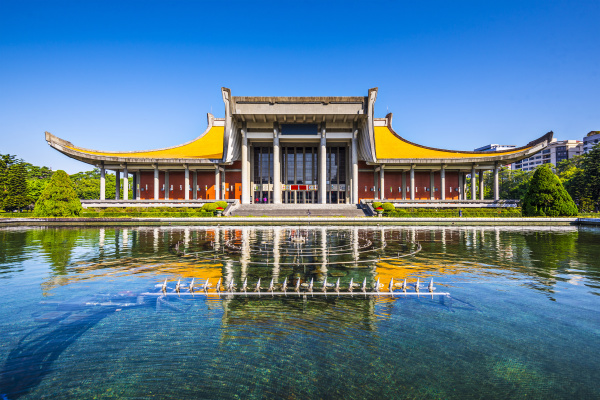
Taiwan National Founding Fathers Memorial Hall (Image source: Adobe Stock)
Press: President of the People’s Republic of ChinaXi JinpingAt the 40th anniversary commemoration meeting of “Letter to Compatriots in Taiwan”Taiwanshout out, hope “one country, two systems“, attracted a lot of criticism. Since the 20th century, the proud “one country” isRepublic of Chinathe Republic of China is a monument in the hearts of countless people. In 2012, Mr. Shen Ning’s speech in Houston – a monument that stands in the heart, was packed with seats. Excerpts are now compiled for the benefit of readers.
1. I have special feelings for the Republic of China
First, I was born in Nanjing during the Republic of China. At that time, Nanjing was the capital of the Republic of China, and my mother was the secretary of the Presidential Office. My maternal grandfather and mother both had a deep relationship with Chiang Zhongzheng. When my parents got married in Shanghai in 1946, General Qian Dajun, the mayor of Shanghai at the time, officiated the wedding. Chiang Zhongzheng sent someone to give him an autograph calligraphy. 49 years later, he was The CCP confiscated it.
Second, there are many elders in my family who were very famous during the Republic of China. I have heard many stories since I was a child and have met some of them. Third, I have a background in literature and like to write. I have published several books on history and done some related research to learn more about historical facts. I have a special sense of crisis. I feel that there is a great need to save the history of the Republic of China. If people of my generation do not work hard to do this, many truths about the history of the Republic of China may be lost and never be recovered.
Now is the 21st century. Looking back, the 100 years from 1900 to 2000, the 1920s, 1930s, and 1940s, those 30 years, which is what everyone often calls the Republic of China period, are actually the most important period in modern Chinese history. The most glorious period. Although the 30 years after the founding of the Republic of China were characterized by constant internal and external troubles and constant wars and wars, it was during that period that all walks of life in China actively turned to modernization, and the society became unprecedentedly prosperous and won international respect.
2. Freedom of speech and freedom of the press during the Republic of China
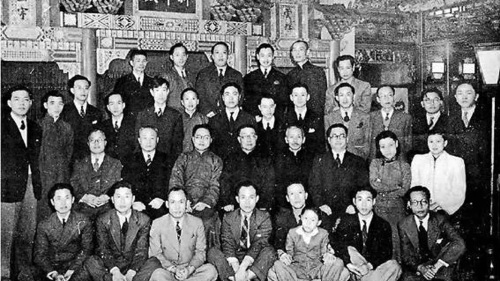
Zhang Jiluan took a group photo with colleagues from Ta Kung Pao. (Internet picture)
The most famous newspaper reporter at that time was Zhang Jiluan, a native of northern Shaanxi, and a student of my great-uncle Mr. Shen Wei. My old man was a member of the Shaanxi Xuetai School at that time, and he ran a Hongdao University. Zhang Jiluan was a student in the school. When he went to Japan to study, my old man went through the procedures and paid for the tuition.
After Zhang Jiluan presided over the Ta Kung Pao, he proposed the policy of four non-principles: no party, no betrayal, no selfishness, and no blindness. Ta Kung Pao never paid attention to the regulations of the Kuomintang and published articles criticizing the National Government all day long. In 1934, Chiang Kai-shek held a banquet in Nanjing. There were hundreds of military and political officials, and the chief guest was Zhang Jiluan. Zhang Jiluan died and was buried in Shaanxi. Jiang Zhongzheng personally ran to help the coffin and bury him.
My father’s good friend Mr. Lu Keng served as the interview director of the Central Daily News and published articles denounced the four major families. The Central Daily News is the KMT party newspaper. The party newspaper scolded the party leaders. Isn’t it strange to read it today? But during the Republic of China, it was not uncommon. Chiang Kai-shek was very angry. My grandfather had a talk with Lu Keng. Even if it was over, Lu Keng would continue to be the director. Not to mention arrests and beheadings, he would not even be demoted. A few years ago, I was chatting with Uncle Lu in San Francisco. He was still very upset and said that my grandfather had a bad attitude when talking to him.
At that time, the most famous person who scolded Chiang Zhongzheng was Ma Yinchu. He scolded him face to face in Chongqing and was reportedly thrown into jail. I have some doubts about whether this statement is true or not, because it was while Mr. Ma was in prison that he published a book. So is he in jail? Even if he is in jail, it is probably a high-level prison. He is not tortured. Tiger Bench Chili Water can actually write and publish books.
My second uncle, Mr. Shen Junru, was also the one who was at odds with the Nationalist government at that time. It is true that he was imprisoned. In prison, he wrote a message: Give me back my country. Look at the photo, how does it look like being in jail? Sitting on a wicker chair, wearing a long gown, being served with paper, ink, pen and inkstone, writing such large characters, hanging them on the wall, and having people take pictures. Ma Yinchu and Shen Junru finally let go and continued to scold Chiang Zhongzheng, but they were still respected.
Speaking of the four major families, I am very skeptical. Repeat a lie a thousand times and you will believe it even if you don’t believe it. My father once went to Lushan to attend a press conference. After Soong Meiling gave her speech, my father stood up and asked why the four major families were corrupt. Soong Meiling refuted him, making the reporters in the room lower their heads and dare not say anything. But later on, Mrs. Jiang was still very good and kind to my family members. Mrs. Chiang is very remarkable. The fact that she lived to be over 100 years old shows that she is not someone who plots and intrigues all day long.
During the Anti-Japanese War, on April 19, 1943, Chiang Kai-shek’s wife Soong Meiling went to the United States to seek assistance on behalf of the National Government and gave a speech to the U.S. Congress. She was upright, confident, calm, and elegant. Her style captivated the U.S. Congress. After her speech, the audience stood up and applauded for four minutes. The speaker of Congress at the time hailed the day when Soong Meiling arrived as a proud day for America, and praised the Chinese first lady as one of the most outstanding women on earth. Someone in the United States commented: Mrs. Chiang’s three-hour stay in the Capitol is an indispensable page in American history and a world-wide event.
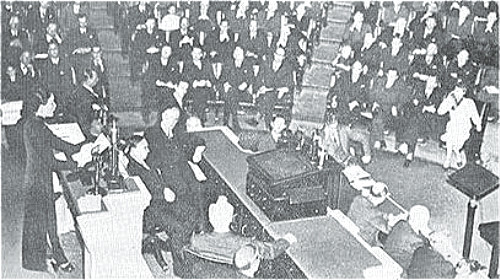
In 1943, Soong Meiling delivered a speech to the U.S. Congress. (Image source: Public domain)
Let’s talk about Soong Ching Ling. My father was the executive director of Soong Ching Ling Foundation during his lifetime. After my father passed away, my brother and sister returned to Beijing from the United States and were invited by the Soong Ching Ling Foundation to visit Soong Ching Ling’s former residence for a discussion. The garden of Soong Ching Ling’s former residence is very large. It is in Houhai, Beijing. It used to be Nalan’s. The palace, but the room Soong Ching Ling lived in was quite simple. When we went to see it, we couldn’t believe that she was meeting foreign heads of state there. I think that people who have been officials in the National Government before will probably not be able to become corrupt no matter what.
Mr. Chen Lifu, who is classified as one of the four major families, was very close to my grandfather. After the victory of the Anti-Japanese War, the Nationalist Government moved back to Nanjing from Chongqing. My grandfather took the moving expenses from the Central Daily News and the family of six arrived in Nanjing. After renting a house, they had no money at all. I was worried about not having lunch when Mr. Chen Lifu walked in the door. He went to Xinjiekou for business and heard that Tao Xisheng had just moved here, so he came to have lunch. Grandma had no choice but to stir-fry two bowls of egg-fried rice. Chen Lifu retired and came to the United States, how to survive? Open a chicken farm. Eating fried rice with eggs and running a chicken farm to make ends meet, is this what the four major families do?
My maternal grandfather was Chiang Kai-shek’s attendant secretary, member of the Central Standing Committee of the Kuomintang, director of the Central Propaganda Department, and chairman of the Central Daily News. He could be considered a high-ranking official. When I first arrived in Taiwan, no matter how senior I was, the Central Party Committee and the Central Daily News would not allocate housing to me. My grandmother went out to look for a house by herself and bought a small house on Xinsheng Road and Xinyi Road in Taipei. At that time, there were only some small Japanese-style bungalows in this place, which were empty and cheap. They were not like the high-rise buildings now.
I bought a house and went to the JoongAng Ilbo to apply for furniture. I only received a dining table with four legs and a wooden board on top. Adding four folding wooden chairs is not enough for each of the five uncles to sit, and there is no place for my grandfather to sit. Grandma had no choice but to buy back two desks and four chairs so that the uncles could barely do their homework. The five uncles go to school and have to eat when they get home from school every day. Time is tight and they eat a lot. My grandmother went out to queue up to buy rice and vegetables every day, but often she was too late, so she had to buy some flour and go home to cook noodles. Later, Mr. Wang Tiwu heard about it and couldn’t bear it, so he sent two bags of rice. My grandmother bought a large earthenware jar for storage and moved several times. The large earthenware jar has been kept without damage. As a souvenir, my uncles are still grateful to Mr. Wang Tiwu and often tell us about it.
3. Scholars and Educators of the Republic of China
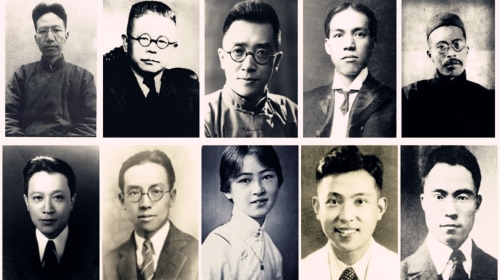
Masters of the Republic of China. (Image source: Look at China Composite Picture)
Hu Shi, Cai Yuanpei, Wang Guowei, Chen Yinke, Mei Yiqi, and scientists Yang Zhenning, Li Zhengdao, Ye Qisun, Qian Xuesen, and Hua Luogeng are all talents created by the Republic of China. There are also artists Zhao Dan, Bai Yang, Mei Lanfang, Ma Lianliang, Wu Zuguang, Xin Fengxia, Hongxiannu, Chang Xiangyu, writers Lu Xun, Ba Jin, Xu Zhimo, Zhu Ziqing, Cao Yu, Shen Congwen, Zhang Ailing, and artists Qi Baishi and Huang Binhong , Zhang Daqian, Fu Baoshi, Li Keran, Xu Beihong, in short, everyone can count on their fingers. From the period of the Republic of China, sixty or seventy years ago, to today, there is no Chinese artist or writer whose achievements can surpass these people. No one can even compare to Hou Baolin in cross talk.
I heard that overseas writers returned to Fujian last year to visit Lin Yutang’s former residence. Think about Lin Yutang’s time, during the Republic of China, no matter what he wrote, he could be published. This principle is quite simple. You must first be able to publish before you can become a master. I sometimes wonder what would happen if Shakespeare, Dickens, Hugo, and Tolstoy were born in China?
If you were born during the Republic of China, you might still have some fun, but if you were not born during the Republic of China, you would be in trouble. If Lin Yutang had not lived during the Republic of China, he would never have become a master. And Zhang Ailing, even if she is lucky if she is not shot, she still wants to write a book? Ba Jin, Cao Yu, Shen Congwen, Lao She, Qian Zhongshu, and Mao Dun left the environment of the Republic of China and lived for several decades, but what about it?
When talking about the figures of the Republic of China, the first one is of course Mr. Sun Yat-sen. During the Double Ten Festival two months ago, a Denver English newspaper published a report saying that when China’s Revolution of 1911 broke out, Sun Yat-sen was in Denver collecting donations for the Republic of China Revolution. He gave a speech in Bode and received a telegram from the Revolutionary Army urging him to return to the country and take office as president. Sun Yat-sen set off in a hurry and took a month’s boat ride before arriving in Shanghai. After reading it, I learned that Denver still has such a fate with the Republic of China, which was quite shocking. We really know too little about the history of the Republic of China and must make up for it quickly.
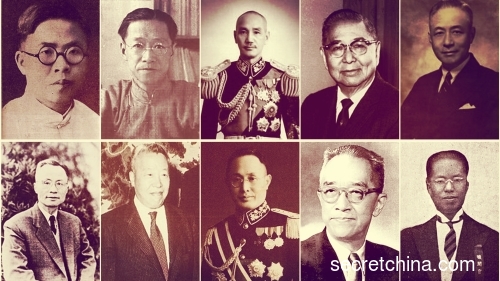
Some celebrities in the Republic of China. (Image source: Look at China Composite Picture)
After Sun Yat-sen, the most important figure in the early Republic of China was Yuan Shikai. No matter how people later commented on Yuan Shikai, calling him a traitor was disrespecting history. When Yuan Shikai was president, Japan made 21 unreasonable demands to the Chinese government in order to steal its interests in China. Yuan Shikai racked his brains, used various means, and disclosed Japan’s demands to the outside world to win public support. It took three months and 25 negotiations, forcing Japan to modify its demands twice. Japan put forward an ultimatum and threatened to launch war by supporting the revolutionary party. Only then did Yuan Shikai agree to Japan’s amendments and sign two of them regarding Shandong and South Manchuria. Neither of these two items lost China’s sovereignty. These original historical materials are said to be still preserved in the Tianjin Museum and can be traced. However, some media still continue to fabricate rumors that Yuan Shikai signed the Twenty-One Articles. Political leaders during the Republic of China at least did not betray the country, but after the Republic of China many people could not even maintain this bottom line.
When the Japanese arrived in North China, they always wanted to find the Beiyang warlords to be their puppets. They did not find Duan Qirui, but they found Wu Peifu. In the impression of most Chinese people, Wu Peifu was a brutal and rude warlord, and that was deceived. In fact, Wu Peifu was born as a scholar. In the late Qing Dynasty, he took the imperial examination in the Prefecture and ranked third among the top scholars. Later, he offended the county magistrate and was dismissed from his service, so he went into exile and joined the army. Because of this, he was much smarter, more capable, and more meritorious than other reckless heroes, and he soon became the commander-in-chief of half of China. The American “Time” magazine was founded in 1923. In the second year, it published a Chinese cover for the first time. It was not Sun Yat-sen or Chiang Kai-shek, but Wu Peifu, calling him the strongest man in China.
At that time, Americans believed that he was the most promising person to unify China. Joffe, Stalin’s special envoy to China, sent a telegram to Stalin saying: After returning from Wu Peifu, I have never seen such a perfect military organization: order and discipline are extremely strict, and drills and training are especially outstanding. Wu Peifu’s death is generally believed to have been caused by Japanese spies. After the Second Zhili-Fengtian War, Wu Peifu was defeated and lived in seclusion. After the September 18th Incident, Wu Peifu sent a telegram to oppose the puppet Manchukuo. In 1935, Japan planned the autonomy of the five provinces of North China and asked Wu Peifu to be the King of North China. Wu Peifu refused.
After the July 7th Incident, the Japanese army asked him to serve as president of the Peking Maintenance Association, but he refused. In 1938, the Japanese army merged the puppet regime in North China and the puppet Nanjing government into a traitor regime, and made Wu Peifu the king of China. Wu Peifu still refused, and the Japanese were very angry. On December 4, 1939, Japanese spy Major General Kawamoto and Japanese military doctor Ishida brought the guards to Wu Peifu’s home. On the pretext of treating his dental disease, they forced an operation, causing his throat to be cut. Blood flowed like a stream, and he died with a single cry and died for his country. On January 24, 1940, Wu Peifu had a funeral. There were thousands of people in the procession. Peking citizens spontaneously gathered along the route and all trams and cars were stopped.
4. I have heard adults talk about how many life-saviors there are in my family since I was a child.
Among them are Du Yuesheng and Wan Molin, the famous Green Gang bosses on the beach. In order to rescue my mother from the Japanese in Shanghai, Du Yuesheng flew from Hong Kong to Chongqing to meet with Chiang Kai-shek. When I returned to Hong Kong, I was intercepted by the Japanese air force and fired fiercely. The pilot raised the plane all the way to get rid of the Japanese plane. The aircraft was poorly equipped at the time, and when it flew to 8,000 feet, the air was thin and Du Yuesheng had difficulty breathing and almost suffocated. Du Yuesheng got off the plane and was carried home on a stretcher. After receiving first aid from a doctor, she regained her breath. From then on, Mr. Du’s health collapsed, and he eventually passed away due to asthma. So it was Mr. Du who exchanged his life for his life to save my mother’s life.
Mr. Du went to Chongqing and showed Chiang Zhongzheng the photo of Wang Ri’s secret appointment that his grandfather had brought to Hong Kong. Jiang Zhongzheng saw it and decided to announce it to the world. After the arrangements were made, Du Yuesheng mentioned that my mother and two uncles were held hostage in Shanghai by the Japanese. After hearing this, Jiang Zhongzheng put the Wang Ri secret agreement back in the filing cabinet and told Du Yuesheng to rescue my mother and others from Shanghai first, and then announce the secret agreement. Because of Jiang Zhongzheng’s order, my mother was rescued from Shanghai by Du Yuesheng’s fifty gunmen.
Yu Dafu, a friend among the elders. When my maternal grandfather was teaching at Anqing Legal and Political College, Yu Dafu had just returned from Japan and worked as a teacher at Anqing No. 1 Middle School and became my friend. They are a group of literary friends and poets who often have gatherings together without any family members. Only Yu Dafu brought his first wife, Sun Quan. Yu Dafu was a passionate country woman who loved him very much. Whether in class or at a party, no matter how busy you are, if you have ten or twenty minutes, you must rush home to see your wife. Anqing is a mountain town where people have to climb up and down. Yu Dafu walked like a whirlwind just to see his wife. My grandfather said that kind of deep love is very rare. No one could have imagined that five years later, Yu Dafu arrived in Shanghai and immediately changed his mind as soon as he joined the revolution. He drove Sun Quan and his children back to his hometown and got engaged to Wang Yingxia in Hangzhou.
Few people today know General Jiang Baili. He is from the same hometown as my father, a native of Jiaxing, Zhejiang Province. He has studied essays since he was a child, has been a scholar, and has close friendships with great writers such as Liang Qichao and Xu Zhimo. He went to Japan to study in the military and enriched the country and strengthened its army. He studied at a Japanese military academy, got excellent grades, ranked first in the school, and received a sword from the emperor, which embarrassed the Japanese. After returning to China, he served as the principal of Baoding Military Academy. As Chiang Kai-shek’s special envoy, he visited Europe and met with Hitler’s second-in-command Göring and Italian dictator Mussolini to obtain weapons and equipment for the Chinese army.
Jiang Baili died of illness in 1938 and was buried on the spot. Ten years later, in 1947, friends assisted in the relocation, and when they lifted the coffin, they discovered that the body was actually immortal. Zhu Kezhen, a close friend during his lifetime, cried loudly: Baili, Baili, is there anything to wait for? I tell you now that our country is victorious! For a moment, everyone burst into tears. The remains were cremated and then moved to West Lake for burial. Jiang Baili’s wife is Japanese, and his three daughters are all very beautiful. One of them, Jiang Ying, a singer, is Mrs. Qian Xuesen. The youngest daughter, Jiang He, was in the same class as my parents at university, and later worked as a German translator in Beijing. When I was a child, I often followed my mother to her house to listen to stories.
In recent years, China has begun to selectively publish some historical facts, including the Gaotao incident during the Anti-Japanese War. If you are interested, you can look for the five-episode TV series “Escape”. The protagonist is my grandfather, and there are also some scenes of my mother. In 1949, Chiang Kai-shek retreated to Taiwan and left Shanghai on a warship. When he arrived at Wusongkou, my grandfather missed my mother and asked Chiang Kai-shek to stop the ship and generate electricity. Shanghai Garrison Commander Tang Enbo sent someone to my home to pick up my mother and me, and took a speedboat to Wusongkou. Get on board and go out to sea together. My mother was determined not to leave.
Speaking of Chiang Kai-shek’s literary genius, Mr. Chen Buli, my family is from the same hometown. My father and two of Mr. Chen Buli’s girls were classmates in middle school, and they once fell in love with their youngest daughter, Chen Lian. Later, Chen Lian and my mother met at the Southwest Associated University. classmate. Later, Chen Lian joined the Communist Party, broke off the relationship with my father, married Yuan Yongxi, and went to join the revolution. The couple were arrested in Peking and escorted to Nanjing.
Jiang Zhongzheng asked Chen Bui to deal with it, which was actually to let Chen Lian and others live. In the end, Chen Bui naturally let his daughter go. Chen Lian and the others arrived in Shanghai and stayed at my mother’s house. After a few days, they headed north to Shandong. Shandong was a Communist base area at the time. Forty-nine years later, Chen Lian was a “senior cadre.” After my father was transferred to Beijing, he went to Tiananmen Square to watch the parade. He met Chen Lian on the viewing platform and said hello. Haven’t seen it since. Later, regarding Chen Lian’s experience, please read this book called “Elegy of Two Generations”. The Shen Jun mentioned in it is my father.
In fact, Mr. Chiang Kai-shek’s Chinese foundation is very good. My grandfather wrote “The Destiny of China” for Chiang Kai-shek, and Chiang Kai-shek corrected it word for word. After the publication of “The Destiny of China”, there were divergent opinions. Jiang Weiguo was not happy and went to my grandfather to discuss it. My grandfather took out the manuscripts one by one and showed them to him. Each page was densely marked with red letters. It was impossible to see my grandfather’s black pen. The entire book was actually written by Chiang Kai-shek himself.
History should not be forgotten. In early October 1942, Chiang Kai-shek urged the United States and other Western countries to voluntarily abandon unequal treaties with China, which was accepted. On January 11, 1943, China, the United States, and China and the United Kingdom signed a new treaty of equality. Subsequently, Western countries successively signed new treaties with China, and the unequal treaties that had harmed China for nearly a century were abolished. In October, Chiang Kai-shek, the United States, Britain and the Soviet Union jointly issued the Four Powers Declaration, jointly shouldering the responsibility for post-war international peace and security.
On November 18, 1943, Chiang Kai-shek and Soong Meiling went to Egypt to hold the Cairo Conference with Roosevelt and Churchill. They advocated that all Chinese lands stolen by Japan, such as Manchuria, Taiwan, and Penghu, should be restored by the Republic of China. After the meeting, China The United States and Britain jointly issued the Cairo Declaration. At that time, Chiang Kai-shek, Roosevelt, and Churchill became the main leaders of the anti-fascist Allies.
5. The Republic of China cannot avoid the War of Resistance Against Japan
In the history of the modern world, which war was more tragic and cost more lives than China’s War of Resistance Against Japanese Aggression? No. At the same time, no nation in the modern world treats their great history more indifferently than the Chinese, treats their own national sacrifices more lightly than the Chinese, treats compatriots who sacrificed their lives heroically with more contempt than the Chinese, and even does not hesitate to continue to be vicious to the dead. Name-calling and insults? Neither.
Here, some specific data must be cited, please analyze it yourself. After the Meiji Restoration, Japan gradually became the leading power in Asia and prepared for war for a long time. By the time of the September 18th Incident, Japan had a well-trained and well-equipped army of 4.5 million troops, a navy equipped with nearly 2 million tons of warships, and 2,700 all-weather aircraft. air force. China, on the other hand, had just experienced the Revolution of 1911 and the Northern Expedition. It had been fighting all year round and had consumed a lot of money. In the early days of the Anti-Japanese War, the Chinese navy only had 50,000 tons of warships, the air force only had 300 old aircraft, and the army plus reserves totaled more than 2.5 million. Soldiers lacked education, and officers lacked modern tactical training.
In the early days of the Anti-Japanese War, a Japanese division was equipped with more than 5,000 horses and more than 500 vehicles, and each soldier had a rifle. Each division of the national army only has 3,800 rifles. Most divisions are not equipped with tanks and artillery, let alone land and air coordination. Most of the Chinese soldiers encountered Japanese tanks on the battlefield, and then they learned that there were such new weapons in the world. The country can mobilize more than 4 million troops, but there are only 1 million rifles in total. The arsenal uses 300 tons of raw materials to make weapons and bullets every month, which must be transported by American aircraft. The average number of bullets produced, including machine gun bullets, was only four per soldier. When General Stilwell served as the U.S. military attache in China, he saw with his own eyes a regiment of the National Army in 1938. The whole regiment only had four light machine guns, each with 200 rounds of bullets, and they were all shot in ten minutes.
In the early days of the Anti-Japanese War, the equipment and strength of the national army were simply unable to compete with the Japanese army. In 1936, only half of the training of the national army was completed, most of the military equipment ordered had not yet arrived, and even the food and ammunition stockpiled for half a year’s war were less than one-third of the quantity. When the Xi’an Incident occurred, Chiang Kai-shek had to accept the conditions for launching a full-scale resistance against Japan. Then the Marco Polo Bridge Incident broke out in 1937, and people across the country became more vocal about the war. The Nationalist Government was forced to declare war on Japan and hastily sent the ill-prepared national army to the front line to fight the Japanese army head-on. Although the national army soldiers fought bravely, the equipment was ultimately different. Too far, repeated battles and defeats.
In the August 13 Songhu Battle in 1937, the total strength of the Chinese army exceeded 750,000, and more than 400,000 officers and soldiers were killed or injured in the battle. Feng Yuxiang recalled that on the battlefield in Shanghai, half of the sky was red when viewed from a hundred miles away. Our troops joined the front line one by one, two divisions by two, every day. Some divisions were half dead within three hours of going up, and some lasted for five hours and two thirds were dead. The twenty-fifth army led by my uncle Wan Yaohuang was completely wiped out in the Battle of Songhu. General Stilwell saw with his own eyes that the Nationalist regiment with only four machine guns fought fiercely for two days and nights with the powerful Japanese army in the Battle of De’an, sacrificing 600 soldiers and injuring 500 officers and soldiers. The remaining officers and soldiers were ordered to withdraw. position.
During the eight-year war of resistance, 6,164 pilots of the Chinese Air Force died for their country, and 468 fighter planes were shot down. The entire national army and navy were wiped out, and all ships were burned down. The casualties of the Chinese army reached 3.22 million officers and soldiers, and 206 generals of the Chinese army died for the country, including 8 generals, 41 lieutenant generals, and 71 major generals. There were 2 group army commanders, 8 army commanders, and 2 deputy army commanders. There are 20 division commanders, 13 deputy division commanders and 17 brigade commanders. The 206 national army generals who died for their country were all members of the Kuomintang, and most of them were outstanding graduates of Huangpu.
On the 80th anniversary of the September 18th Incident, I wrote a book called “The Monument Standing in the Heart.” I have these words in the preface: “Think about it, the reason why we are still alive today, and the reason why our Chinese nation continues to We are surviving because of those heroes who fought in the War of Resistance Against Japan We owe them thousands of lives and endless kindness for rebirth. If we cannot build towering anti-Japanese war monuments on every inch of our motherland, we should at least build them in everyone’s heart. A sacred monument to the war.”
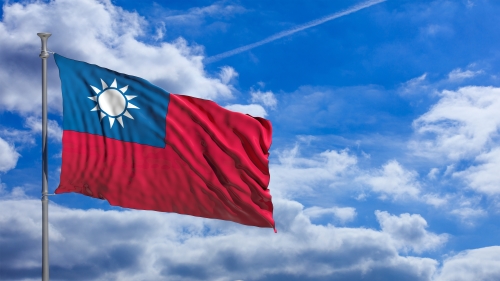
Flag of the Republic of China (Image source: Adobe Stock)
Note: Mr. Shen Ning’s grandfather Tao Xisheng and uncle Shen Junru are both famous figures in modern Chinese history. He came to the United States to study in the early 1980s and served as a news anchor for the Voice of America and an instructor at the U.S. Air Force School. Published books such as “Fifteen Years in the United States”, “War Zone – Witnessing American Primary and Secondary Schools”, “Business Eyes”, “Click on American Primary and Secondary School Education”, “US Military Instructor’s Notes”, and full-length biographical novels “Suona Smoke”, “Bai Shi Family Style” “wait. In 2008, Shen Ning traveled to Taiwan and wrote “Six Days in Taipei”, which received a wide response. In the same year, he created “Dignitaries and Celebrities in the Memory of a Family”, which tells the unforgettable stories of well-known figures of the Republic of China, such as Cai Yuanpei, Yu Dafu, Du Yuesheng, Chiang Kai-shek, Hu Shi, Chen Bulei, Jiang Weiguo, etc. (This article is slightly abridged)
Editor in charge: Fu Longshan
Short URL:
All rights reserved. Reprinting in any form requires permission from this site.It is strictly prohibited to create mirror websites.
[Honorary Members Wanted]Streams can merge into the sea, and small kindnesses can achieve great love. We sincerely recruit 10,000 honorary members from Chinese people all over the world: each honorary member only needs to pay a subscription fee per year and become an honorary member of the “Look at China” website, which can help us break through censorship and blockade and provide services to at least 10,000 mainland Chinese compatriots. Provide independent and true key information to warn them in times of crisis and save them from pandemics and other social crises.



